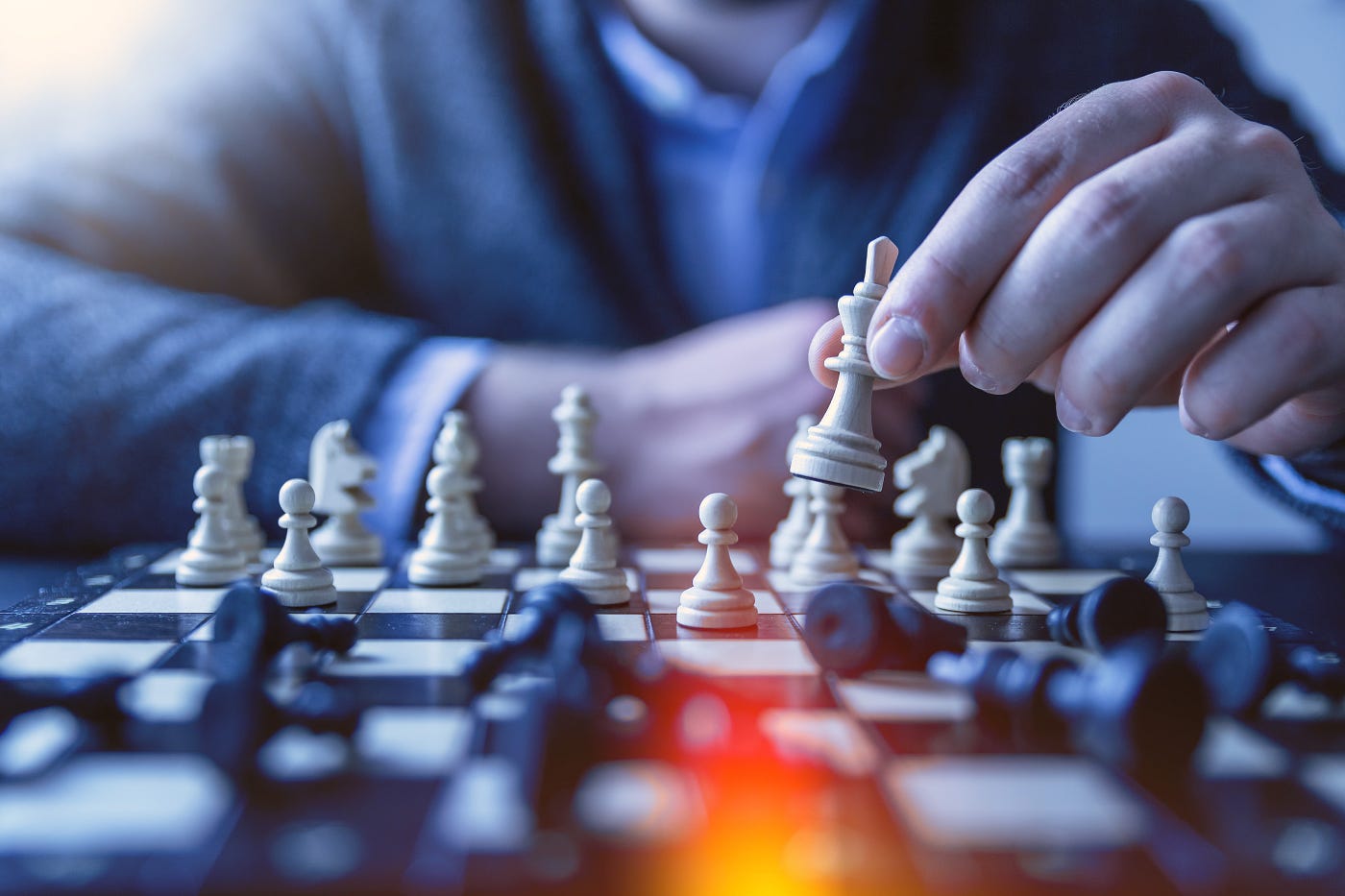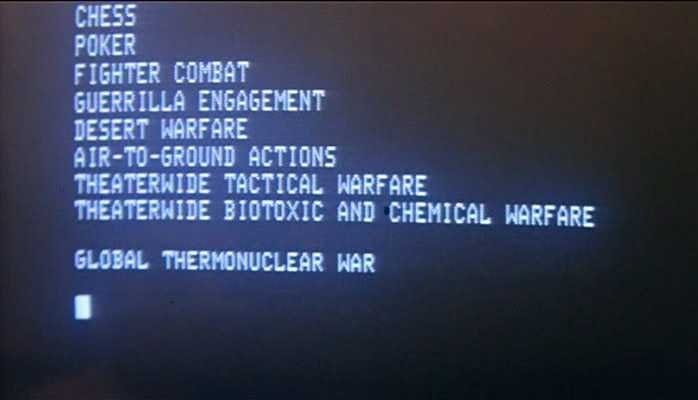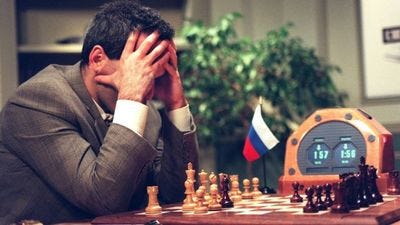Human Go Champion Backtracks on Vow to Never Face an Ai Opponent Again
Bested past AI: What Happens When AI Wins?
AI is already ameliorate than yous at certain tasks. Hither are some thoughts on how to cope.

A few months ago, I sent my dad the article 20 Top Lawyers Were Beaten past Legal AI in a Controlled Study, which (as the title suggests) discusses a report on how AI can be practical to the field of law, and how it performs confronting professional lawers. An implication of this commodity is the potential to replace lawyers with AI for many common legal needs, such as contract review or writing wills.
It's an interesting article and application of AI, which I spend a lot of time thinking about. Information technology might seem pretty innocent that I shared information technology with my dad, and it would exist, except that my dad is a lawyer.
Yes, I was kind of trying to become a ascension out of him (it's all affectionate, I hope).
Right now, it seems similar hardly a calendar week goes by without encountering an commodity that claims AI is virtually to take all our jobs (then turn into Skynet and impale usa all). AI is being applied to many diverse applications, and it can frequently feel like the ultimate goal of any AI projection is to outperform humanity.
An explicit version of AI vs. Homo is oft seen in the gaming world, where advanced AI are pitted against professional person gamers as a criterion for AI's abilities and sophistication.
Why Are We Teaching AI to Play Games?
Information technology seems like ever since researchers accept been exploring and developing artificial intelligence, they take also been education their AI to play games.
Despite what you might remember, information technology is decidedly not a waste of time and money to teach AI to play games.

In games, there are inherent rules and rewards. This makes games easy to teach to AI as a "scorable" proxy for circuitous tasks. Games help developers track the progress of AI. Games provide a safe (no existent lives at stake) yet robust manner to test the operation of AI because the performance of the AI is quantifiable via score.
Oft the pinnacle of testing a gaming AI is to have it play confronting a human being champion.
Man vs. Machine
1 of the near notable early faceoffs between a human champion and AI happened in 1996 and 1997, where IBM'due south Deep Blue played a world champion chess player, Garry Kasparov. Although Kasparov lost the beginning game of their first match in 1996, he was able to adapt to Deep Bluish's arroyo to chess and win three of the six games, taking the lucifer.
Kasparov agreed to a rematch confronting Deep Blue in 1997. This match included 6 games. Deep Blueish fabricated an unexpected motion in game two — it passed on the opportunity to capture an exposed pawn to brand a move that had more than benefits in the long term. Kasparov was perplexed past this very human being-seeming move, and it threw Kasparov off his game (funny story, this move may accept been the event of a bug). Regardless of what sparked this move, Kasparov ended up losing this match.
By modern standards, Deep Blue's AI was pretty rudimentary. To play chess, Deep Blue was coded to use a animal-force method, analyzing many different sequences before making a move. When Deep Bluish defeated Kasparov, people speculated that the next criterion for AI excellence in gaming would be the Chinese game of Get, which would be difficult to code a computer using the same methods, due to the much higher number of possible moves and sequences in Go. People speculated it would be 100s of years before a homo could be defeated by Go-playing AI.
AI defeating man Go champions, comparable to Deep Blueish vs. Kasparov, started to become mainstream in 2015 with DeepMind'south AlphaGo. First, AlphaGo defeated European Become champion Fan Hui (2015), and then in 2016 AlphaGo took on South Korean champion (at the time, he was ranked 2nd in international titles) Lee Sedol in a highly publicized match, and then in 2017 faced Chinese champion Ke Jie (at the time of the match, Ke Jie was ranked number one in the world by multiple Go associations).
AlphaGo was based on a far more complex framework than information technology's spiritual predecessor Deep Blue. AlphaGo leveraged deep learning to learn how to play the game of Go. A more contempo iteration of AlphaGo, AlphaGo Nothing, was trained entirely past beingness given the rules and then playing the game confronting itself. This new framework has been applied to the games of Chess and Shogi too as Go in the newest iteration, AlphaZero.
Chess and Go are two popular examples of AI winning against humans, but there are many more examples (like Jeopardy) of AI defeating humans in plow-based games where the AI only needs to procedure one thing at a time and is given acceptable time to do and so.
More than recently, researchers accept focused on video games equally the side by side dandy arena for AI. Video games are a challenge because the players need to answer in real time, and ofttimes need to divide attending between many different aspects of the game. OpenAI and DeepMind have been featured in the news this twelvemonth for their AI playing Dota 2 and Starcraft ii, respectively.
Although these video-game playing AI systems accept had some considerable success, they have not dominated their corresponding gaming platforms in the aforementioned fashion their turn-based brethren have, all the same. For a more in-depth overview of gaming AI in the past and present, read AIs are Better Gamers than Us, and That's Okay, from Jamie Rigg at Engadget.
Recovering from Defeat at the Easily of AI
In each meet between an AI and a man champion, to some extent, the champion fighting for humankind is defending the honour of our species. Losing is difficult. Losing to an opponent that is not human is fifty-fifty harder.
In 1996 and 1997, the pressure was loftier for Kasparov, a highly respected and admired world champion of Chess. Prior to the friction match, publications were put out with titles like "The Brain's Last Stand." Even though Kasparov went into the matches confident, he was visibly frustrated and even rattled by an unexpected move from Deep Blueish.
My parents have often told me that when y'all beginning an statement with a two-yr-former, you've already lost. Similarly, when you get emotional when facing an AI, you've already lost. Many people attribute Kasparov'south loss to how Deep Bluish was able to go into his head.

Following his loss, Kasparov actually defendant IBM of cheating, creating somewhat of a conspiracy theory effectually the lucifer. Surely, AI wasn't adult plenty to make these kinds of moves or develop novel strategy nonetheless, right? The only caption was human being interference. At least in this scenario, Kasparov would have lost to another (devious) person, and non to an existentially threatening estimator.
A person will experience the force per unit area and context of a state of affairs. When AI is taking on these matches, it is not really aware that it isn't but playing another training match against another AI. The stakes in these face-offs accept always been much higher for the human.
After the third game of his Go match with AlphaGo, Lee Sedol actually apologized for losing:
I don't know how to get-go or what to say today, but I call back I would have to limited my apologies start. I should take shown a ameliorate issue, a better outcome, and better content in terms of the game played, and I practice repent for not being able to satisfy a lot of people'south expectations. I kind of felt powerless. If I look back on the three matches, the first one, even if I were to get back and redo the first friction match, I think that I would not have been able to win, considering I at that time misjudged the capabilities of AlphaGo.

Lee Sedol ended up taking one of the v matches played against AlphaGo. At the end of the match, despite having lost four of the v games, he said this:
Personally, I am regretful near the issue, but would like to express my gratitude to everyone who supported and encouraged me throughout the friction match… I accept questioned at some points in my life whether I truly enjoy the game of Get, merely I admit that I enjoyed all five games against AlphaGo. After my feel with AlphaGo, I take come to question the classical behavior a little scrap, so I have more study to do.
Following his loss to AlphaGo, in a like sentiment to Lee Sedol, champion Ke Jie has spent time learning from how AlphaGo plays. His accept away from the matches was that people merely don't know every bit much well-nigh Go equally they idea they did, and in that location is even so so much to learn. He has gone on to write books nearly the lessons learned from AlphaGo.
AlphaGo and AlphaZero have influenced the fashion games like Chess, Shogi and Become are played. What people are realizing is that despite what traditional wisdom would tell u.s.a., there is and so much that Become masters don't know nigh the game. Having this external vision of play is irresolute how the game is played. AI is not bound by convention.
xx years after the match, Kasparov is able to reflect on his experience more dispassionately. He has rescinded and apologized for a lot of his accusations towards the Deep Blue team at IBM. He has likewise written a volume virtually his experiences facing AI (Deep Thinking). He is now an optimistic advocate for working with AI to enable a better future.
Losing to AI as an Academic
Every ii years, there is a globally-held experiment/contest for researchers in the field of protein construction modeling chosen the Disquisitional Assessment of Structure Prediction (CASP). The goal of this event is to give researchers an objective manner to test construction prediction methods on a global phase. Every bit Sigal Samuel at Vox puts it, CASP is pretty much a "fancy science contest for grown-ups."
The winning submission to the CASP13 conference, held concluding twelvemonth, was DeepMind'south AlphaFold.
This type of research is the life'south work of many biologists, including Dr. Mohammed AlQuraishi (of Harvard), who wrote a really interesting mail service on his personal blog about the experience of being bested by AI. In his blog, he writes well-nigh being afraid he had been outperformed past AI, feeling relieved when he realized that the insights from AlphaFold were in-line with where research in the field is, and and so crediting the success of AlphaFold to the deep pockets of its parent company, Alphabet.
He also reflects that DeepMind's power to come into a field as an outsider and make meaning progress indicates somewhat of a structural inefficiency in academia and large pharma. Academia's competitive nature prevents information from beingness openly shared (causing each research group to have to rediscover things on their own, wasting time and effort), and pharmaceutical companies tend to focus on sales over novel research.
Ultimately, AlQuraishi concludes that the discoveries by AlphaFold are a good thing — there was a major advance in one of biochemistry's most important problems. This resulted in higher visibility for the field and intellectual advocacy for all researchers involved. Who (or what) did the discovering is less important. His suggestions for researchers to adapt to AI include focusing on bug that crave more conceptual breakthroughs, and leave more technology-heavy problems to AI research groups.
What Should Nosotros Do When AI Comes for The states and Our Jobs?
AI will probably eliminate some jobs in the future. Which jobs and when is unclear. As Mohammed AlQuraishi explains in his interview with Vox's Sigal Samuel (yes I've linked this commodity twice, it'due south actually proficient and I wish I wrote it):
At one point, a lot of people thought there was a hierarchy among jobs — intellectual jobs would be the concluding to exist replaced and mechanical jobs would be the commencement. But that'southward really unclear. It may well exist that jobs that are mechanical will have a long time to replace because information technology's actually difficult to make robots that make certain gestures. And things in the higher echelons of intellect can maybe be more quickly replaced.
Equally we have learned from each of our human champions that accept had to directly face the prospect of obsoletion at the hands of AI, we tin can choose to see this as an opportunity to learn and do something different. AI opens the opportunity for new and exciting jobs. As AI gets better than us at some tasks, nosotros will but need to discover new tasks to accept on. We likewise demand to play an active role in determining what AI is developed and ensure that the jobs given to AI are conducted in an ethical manner.

My dad really told me not to go to police force school x years ago, probably well earlier AI applications in law were being explored. AI applications for legal work are being explored because there is an opportunity to make something more efficient and constructive, not just for fun or to spite lawyers (well, maybe a petty).
Some other affair my dad used to tell me when I was younger is that the job I would end upwards having every bit an adult hadn't been invented still. In a sense, he was right. I don't call back professionally blogging about data science and analytics for a software company had quite hit the mainstream in the nineties. In a less literal sense, I think he meant that the needs of today are non going to exist the same every bit the needs of tomorrow, and if you're adaptive and open yous can stop up doing something new that people haven't done before.
Every time we invent a new technology, jobs are disrupted. Think well-nigh how farms and factories look today compared to how they looked 100 years ago. Industries primed to have AI introduced are the industries that AI can improve efficiency in, potentially making lives better for the terminate consumers, and hopefully society equally a whole.
Original. Reposted with Permission.
dadeiteriabittem46.blogspot.com
Source: https://towardsdatascience.com/bested-by-ai-what-happens-when-ai-wins-22388706482d
0 Response to "Human Go Champion Backtracks on Vow to Never Face an Ai Opponent Again"
Post a Comment